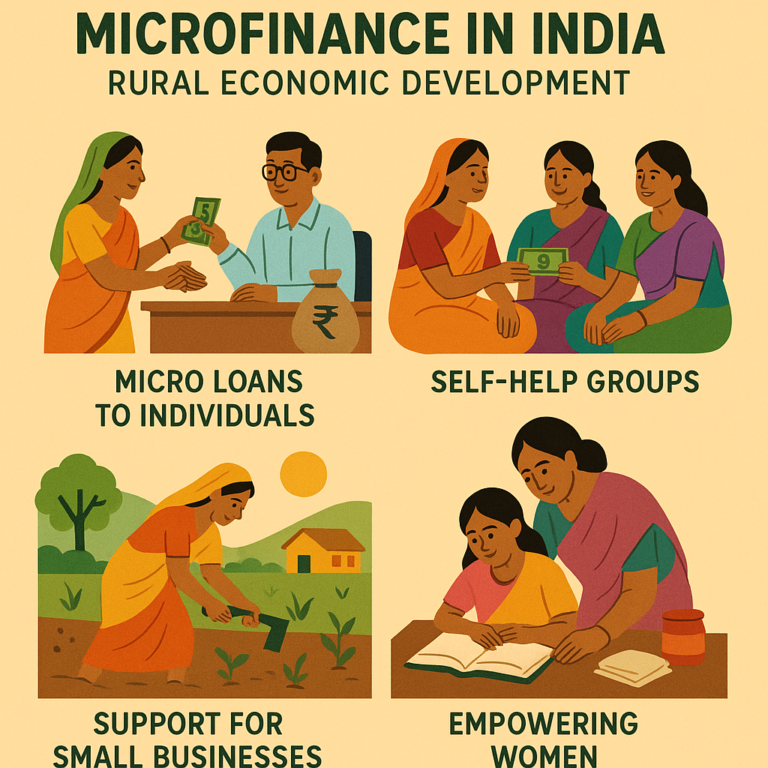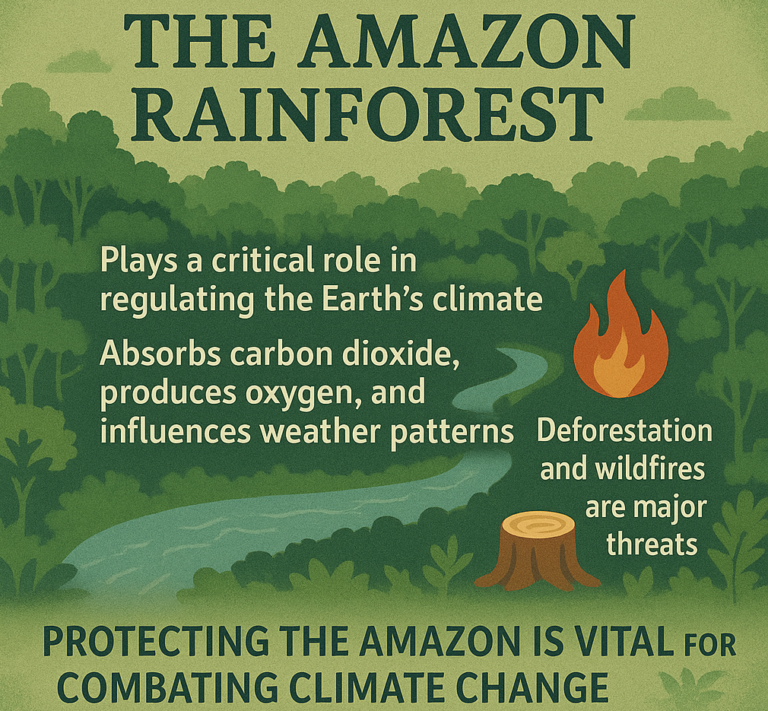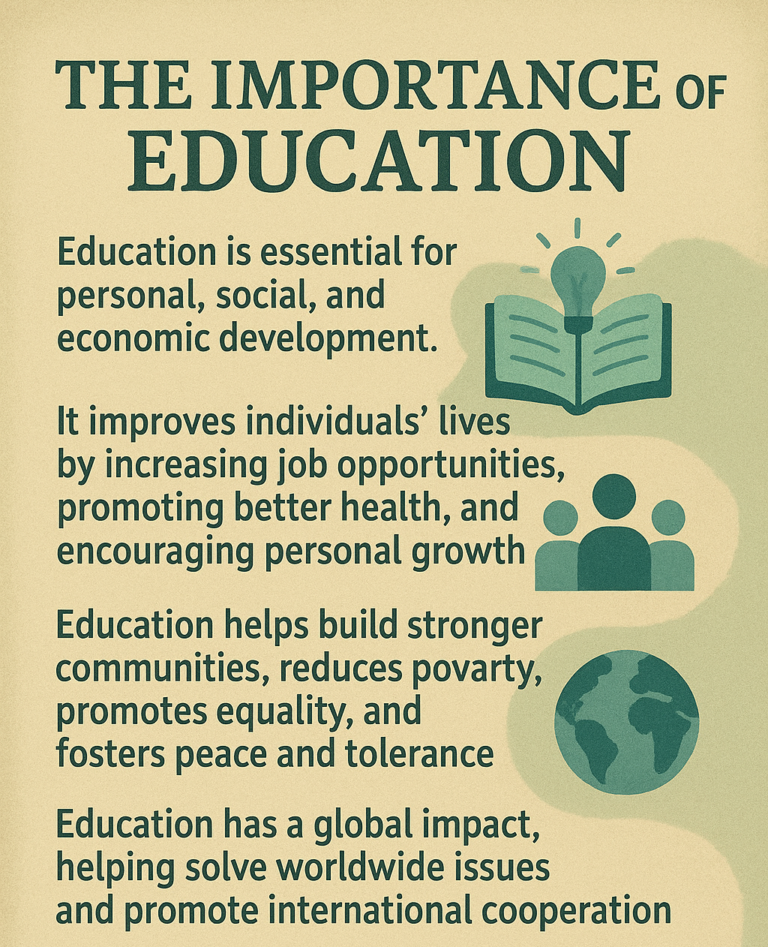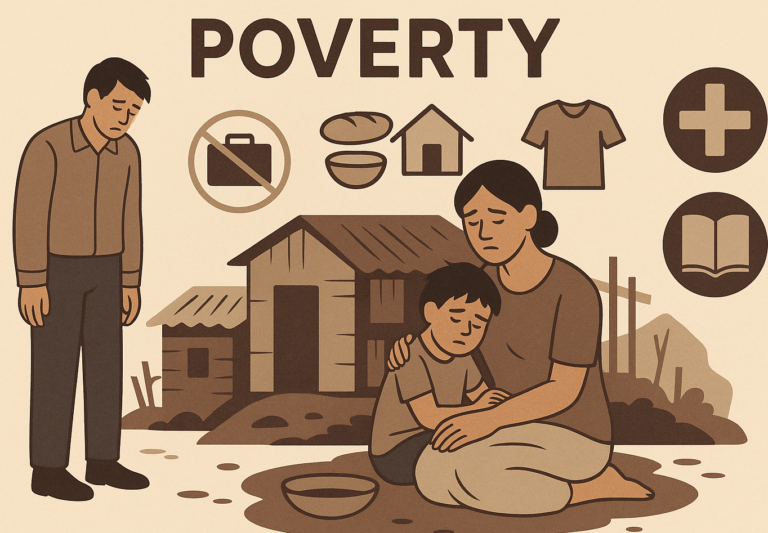1. Poverty
Poverty means not having enough money or resources to meet basic needs like food, clothing, shelter, education, and healthcare. It affects people and families, and it can happen for many reasons, such as not having a job, living in a place with few resources, or having little access to education.
Why does poverty happen?
- Lack of Jobs: If there are no jobs available or if people can’t find work, they may not be able to earn money to support themselves and their families.
- Low Wages: Even if people have jobs, sometimes the wages (money they earn) aren’t enough to cover their basic needs. For example, a person working a minimum-wage job might struggle to afford rent or food.
- Health Problems: If someone becomes sick or injured, they may not be able to work, which can push them into poverty.
- Lack of Education: Without education or skills, it’s harder to get well-paying jobs, which can trap people in poverty.
- Economic Crisis: Sometimes, things like a recession (a period of economic decline) or natural disasters can make life harder for many people, leading to poverty.
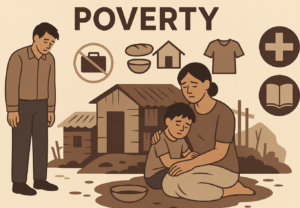
Types of Poverty:
- Absolute Poverty: This is when people live without basic necessities like food, clean water, and shelter. It’s the most severe form of poverty.
- Example: A family living in a slum with no access to clean water or proper sanitation.
- Relative Poverty: This occurs when people may have their basic needs met but still don’t have enough resources compared to others in society. They might feel left out or struggle to live a decent life.
- Example: A person in a country where the average income is high, but they earn much less, making it hard to afford things like a car, proper healthcare, or quality education.
2. Unemployment
Unemployment happens when people who are able and willing to work can’t find a job. Even though there may be job openings in the economy, some people still can’t get hired. Unemployment is a big issue because it means people don’t have a steady income and can’t afford to take care of themselves or their families.
Why does unemployment happen?
- Lack of Job Opportunities: Sometimes, there are not enough jobs for everyone who wants to work. This can happen during an economic recession when businesses close or reduce staff.
- Skill Mismatch: Sometimes, people may not have the right skills or education that companies are looking for, which makes it harder for them to find a job.
- Seasonal Jobs: Some jobs are only available during certain seasons, like farming or tourism, so people may be unemployed during off-seasons.
- Technological Changes: New technology can replace certain jobs. For example, machines might take over tasks that were previously done by workers.
Types of Unemployment:
- Frictional Unemployment: This happens when people are temporarily unemployed because they are between jobs or looking for their first job.
- Example: A person quits their job to look for a better opportunity and is unemployed for a short time.
- Structural Unemployment: This happens when the skills of workers do not match the jobs available in the economy. It can also occur when industries change, and certain jobs disappear.
- Example: A worker who has been in the coal industry for years might not have the skills needed to work in a growing tech field.
- Cyclical Unemployment: This type of unemployment happens because of downturns in the economy. During recessions, many companies may lay off workers, leading to higher unemployment.
- Example: During an economic recession, a car company may cut jobs because fewer people are buying cars.
3. Economic Inequality
Economic inequality refers to the difference in income and wealth between individuals or groups in society. Some people are rich, while others are poor, and this gap can be large.
Why does economic inequality happen?
- Unequal Access to Education: People with better education usually get better jobs that pay more, while people with less education may have fewer job opportunities and lower wages.
- Differences in Skills: People with special skills, like doctors or engineers, often earn much more money than those in jobs that require fewer skills.
- Inheritance: Some people are born into wealthy families with more resources, while others may not have as much to start with.
- Globalization and Technology: In a globalized world, companies can hire workers from countries where wages are lower. Technology also rewards people who can innovate or manage it well, leaving others behind.
- Discrimination: Sometimes, people are paid less or treated unfairly because of things like gender, race, or where they come from, leading to inequality in the economy.
Consequences of Economic Inequality:
- Social Issues: When the gap between the rich and poor becomes too large, it can lead to social unrest and conflicts. People may feel frustrated or angry about their situation.
- Limited Opportunities: Economic inequality means that many people, especially from poor backgrounds, may not have access to the same opportunities as the rich. This can affect their ability to get an education, healthcare, or even basic needs.
- Health Problems: Inequality often leads to poor living conditions for the lower-income population. This can result in poor health, stress, and a lower quality of life.
- Stunted Economic Growth: When only a small group of people control most of the wealth, it can slow down the overall growth of the economy. The economy thrives when people from all classes have access to opportunities to spend and invest money.
How to Address These Issues?
- Reducing Poverty:
- Social Welfare Programs: Governments can provide support like food aid, healthcare, and housing assistance to help people in poverty.
- Access to Education: Providing free or affordable education can help people get better jobs and escape poverty.
- Economic Growth: Encouraging businesses to grow and create jobs can help lift people out of poverty.
- Reducing Unemployment:
- Job Training: Offering vocational training and skill development programs can help people get the skills they need for available jobs.
- Government Stimulus: Governments can encourage job creation by offering financial help to businesses and workers during tough times.
- Supporting New Industries: Encouraging new businesses, like in technology or green energy, can create jobs and reduce unemployment.
- Reducing Economic Inequality:
- Fair Wages: Ensuring that workers are paid fairly for their work, with a living wage that helps them meet basic needs.
- Progressive Taxation: A system where wealthier people or businesses pay a higher percentage of their income in taxes, which can be used for social programs.
- Access to Healthcare and Education: Making sure that everyone has access to good healthcare and quality education, regardless of their economic background.
Key Takeaways:
- Poverty is when people don’t have enough resources to meet basic needs like food, shelter, and healthcare. It can happen because of unemployment, low wages, health problems, and more.
- Unemployment happens when people who want to work can’t find jobs. It can be caused by a lack of job opportunities, skill mismatches, or economic downturns.
- Economic Inequality refers to the unequal distribution of wealth and income. It can lead to social problems and reduced opportunities for many people.





